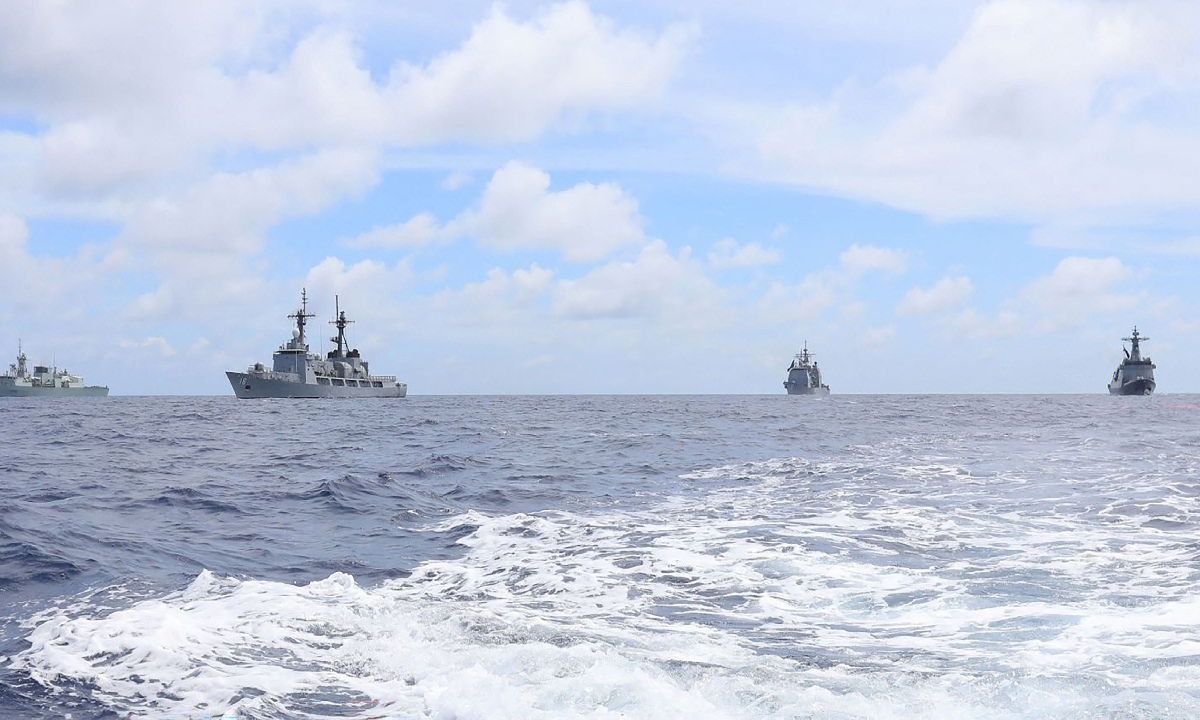By Hu Yuwei and Huang Lanlan

The troops of the US, Canada, Australia and the Philippines conduct a multilateral maritime exercise in the South China Sea on August 7, 2024. Photo: VCG
For a long time after World War II concluded, the international community broadly acknowledged China's sovereignty and associated rights in the South China Sea. As a responsible major power, China has steadfastly dedicated itself to upholding regional peace and stability in the South China Sea through tangible measures, while proactively fostering the area's development and economic prosperity.
In 2002, China and the 10 ASEAN countries signed the Declaration on the Conduct of Parties in the South China Sea (DOC). This agreement embodies the common commitment of China and ASEAN members to maintain peace and stability in the South China Sea, serving as a key framework for directing and advancing regional security.
Prior to the Cold War's conclusion, the US did not openly contest China's sovereignty assertions over the islands and reefs in the South China Sea; instead, it avoided supporting its allies on the matter. It was not until the 1990s that Washington started shifting its position.
As the US loudly declared its "pivot to Asia" in the 2010s, its meddling in the South China Sea escalated alongside heightened involvement and more provocative actions, transforming this formerly serene sea into a hotbed of hidden tensions, roiled by fierce storms and choppy waters, Dai Fan, vice dean of the School of International Studies at Jinan University, told the Global Times.
This article, based on official documents, authoritative media reports, and expert interviews, exposes US tactics used in recent years to meddle in the South China Sea, including cognitive and opinion warfare against China, undermining China's ties with regional states, and stoking an arms race. It reveals how US interventions to preserve hegemony disrupt normal cooperative activities in the South China Sea, and are the primary cause of regional instability, clashing with the desires of neighboring countries and the world for peace, development, and collaboration.
Initiator of cognitive warfare against China
A report titled "Making the South China Sea a Sea of Peace, Friendship and Cooperation: China's Actions" that was released by the Xinhua Institute, a think tank affiliated with the Xinhua News Agency, in late August found that since the Obama administration, US government agencies, think tanks, and media outlets have continuously promoted claims such as "China seeks to control the South China Sea," "China does not abide by international law," "China is undermining the rules-based international order," and "China is coercing its maritime neighbors." These claims, often based on selective or even distorted information, have been used to comprehensively stigmatize China's policies and actions in safeguarding its maritime rights. In recent years, US tactics in this regard have escalated, becoming increasingly direct and vociferous.
The US and its Western allies, leveraging their dominance in international discourse, mischaracterize the intrusions and provocations by certain claimant states in the South China Sea as "safeguarding sovereignty," while framing China's legitimate rights protection and law enforcement as "hegemonic" actions of a powerful nation "bullying" regional countries. They deliberately exaggerate the so-called "military threat" from China in the South China Sea, the Xinhua Institute's report stated.
For instance, in 2022, Stanford University's Gordian Knot Center for National Security Innovation launched the "Myoushu" project (now known as "SeaLight"), which disseminates a daily stream of mixed factual and misleading situational data. The initiative focuses on tracking China's maritime activities, fabricating rumors, and deliberately hyping the claim of "Chinese maritime threat and expansion."
Additionally, the US and its allies have provided strategic counsel and support to claimant states in their provocations and confrontations against China. They keep enlisting the power of Western media outlets to stand behind and build momentum for their illegal acts.
Since 2023, the Philippines has implemented the so-called "transparency policy," aiming to leverage media narratives to portray China as a regional power that "bullies" smaller neighbors in the South China Sea. According to Filipino political commentator Herman Laurel, this strategy is part of "Project Myoushu," led by retired US Air Force officer Raymond Powell.
Multiple Western media organizations in including BBC, CNN, have participated in this propaganda effort, sending journalists on Philippine ships during their intrusions into Chinese islands and reefs in the South China Sea, then releasing stories that portray China unfavorably.



